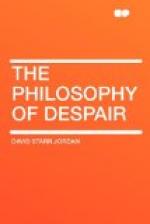There is much to discourage in human history, — in the facts of human life. The common man, after all the ages, is still very common. He is ignorant, reckless, unjust, selfish, easily misled. All public affairs bear the stamp of his weakness. Especially is this shown in the prevalence of destructive strife. The boasted progress of civilization is dissolved in the barbarism of war. Whether glory or conquest or commercial greed be war’s purpose, the ultimate result of war is death. Its essential feature is the slaughter of the young, the brave, the ambitious, the hopeful, leaving the weak, the sickly, the discouraged to perpetuate the race. Thus all militant, nations become decadent ones. Thus the glory of Rome, her conquests and her splendor of achievement, left the Romans at home a nation of cowards, and such they are to this day. For those who survive are not the sons of the Romans, but of the slaves, scullions, the idlers and camp-followers whom the years of Roman glory could not use and did not destroy. War blasts and withers all that is worthy in the works of man.
That there seems no way out of this is the cause of the sullen despair of so many scholars of Continental Europe. The millennium is not in sight. It is farther away than fifty years ago. The future is narrowing down and men do not care to forecast it. It is enough to grasp what we may of the present. We hear “the ring of the hammer on the scaffold.” “Let us eat and drink, for tomorrow we die.” “The sad kings,” in Watson’s phrase, can only pile up fuel for their own destruction, and the failure of force will release the unholy brood which force has caused to develop. The winds of freedom are tainted by sulphurous exhalations. In all our merry-making we find with Ibsen that “there is a corpse on board.” The mask is falling only to show the Death’s head there concealed. Aristocracy, Democracy, Anarchy, Empire, the history of politics, is the eternal round of the Dance of Death.
When we look at human nature in detail we find more of animal than of angel, and the “veracity of thought and action,” which is the choicest gift of Science, is lost in the happy-go-lucky movement of the human mob. “To see things as they really are” is the purpose of the philosophy of Pessimism in the hands of its worthiest exponents. But we know what is, and that alone, even were such knowledge possible, is not to know the truth. The higher wisdom seeks to find the forces at work to produce that which now is. The present time is the meeting time of forces; the present fact their temporary product. To the philosophy of Evolution, “every meanest day is the conflux of two eternities.” Each meanest fact is the product of the world-forces that lie behind it; each meanest man the resultant of the vast powers, alive in human nature, struggling since life began. And these forces, omnipotent and eternal, will never cease their work.
To the philosophy of Pessimism, the child is a mere human larva, weak, perverse, disagreeable, the heir of mortality, with all manner of “defects of doubt and taints of blood,” gathered in the long experience of its wretched parentage.




